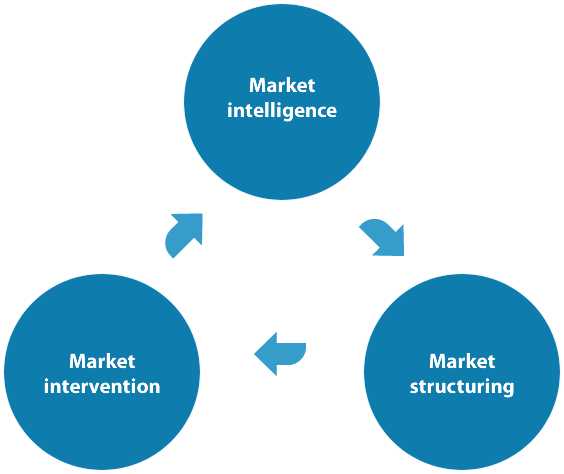What is market shaping?
To start with, a council's role was to make sure that there was a sufficient supply of different types of services. This was sometimes characterised as market management or market control. Over time, however, there has been a shift to market shaping and market facilitation. As more and more people have control over the big decisions that affect their lives and the funding for their own care and support (through personal budgets and direct payments), so the amount of money for commissioning people's care in blocks reduces. This means that it is more difficult for councils to control the market themselves through direct purchasing of large volumes of care, and so an approach to commissioning that is based on councils, providers and citizens working together is now needed.
The brief summary below shows the differences between management or control and market shaping or facilitation
Term: Market management and market control
What does the term mean? Councils tell providers to deliver certain services. Commissioners are the main people in charge of how the services are designed and delivered. Commissioners have the control.
Term: Market shaping and facilitation
What does the term mean? Commissioners work with people and providers to understand how people want to live a good life (See Manchester & Kirklees examples). They work to make sure that different types of support are available at the right price to achieve this now and in the future. Commissioners, citizens and service providers collaborate.
The shift from market management and control to market shaping shows that the task of facilitating a diverse market of personalised care and support services cannot be achieved by the council acting on its own. Innovative support solutions will not emerge unless councils work together with providers. It also needs co-production with carers, people who use services and their families. This is made clear in the statutory guidance to the Care Act. For example it explains market shaping as:
"the authority collaborating closely with other relevant partners, including people with care and support needs, carers and families, to facilitate the whole market in its area for care, support and related services".[23]
In a similar way, Think Local Act Personal say that:
'Three core perspectives must be brought together to create a partnership approach to market facilitation in social care. These are those of the individuals who use or will use care and support services ('people, carers and families'); those of people and organisations who provide them (providers); and those of people and organisations who seek to influence/ secure them on behalf of others (commissioners). It will be important for each of these parties to have involvement, built around a clear and unambiguous understanding of what they and others bring to the table and what they take away from it in terms of tasks and responsibilities'[24].
Market shaping is often described as a cycle of activities that are related to each other: [25]

- Market intelligence - this is when the council gathers information, including finding out about the market and what services and support is already available. The council finds out about the outcomes that people feel are important, how these are being achieved at the moment and what services and support is missing. It also includes important information about the area such as needs of the people who live there and information about what services cost. The statutory guidance to the Care Act recommends that councils publish the results of the market intelligence stage in a Market Position Statement. (See Manchester Market Position Statement)
- Market structuring - this is when the councils develops its plans. It leads to the council saying what they plan to do to make sure that there is a good range of social care services and support available. This includes 'making explicit to the sector how the commissioner intends to perform and behave in influencing the market'.[26]
- Market intervention - this is when action happens. It leads to activities to make sure that there is a good range of care services and supports available. This involves the actions 'commissioners make in order to deliver the kind of market believed to be necessary for any given community'.[27] This might include supporting new types of organisations or services to develop or providing training to increase existing providers skills.
The Developing Care Markets for Quality and Choice (DCMQC) programme has published a range of resources to support councils to deliver their market shaping function (opens new window).
[23] Department of Health. (2014). Care and Support Statutory Guidance: Issued under the Care Act 2014. (opens new window) p.42.
[24] Bennet, S. (2012). Stronger Partnerships for Better Outcomes: A Protocol for Better Market Relations. Think Local Act Personal. (opens new window) p.3.
[25] Institute for Public Care. (2014). DCMQC Briefing Paper 1: The Basics of Market Facilitation. (opens new window) p.4
[26] Ibid
[27] Ibid
